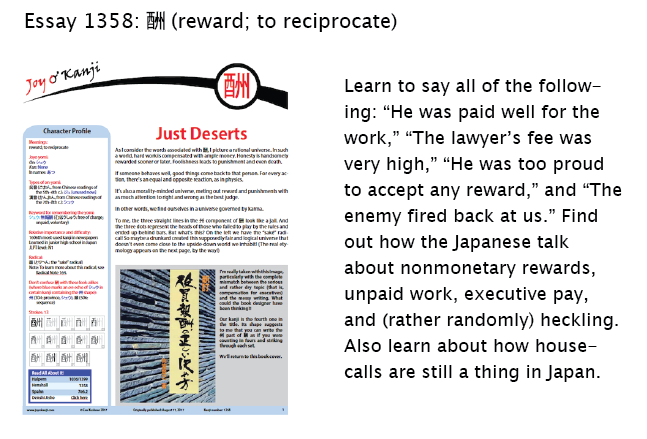Horses of Different Colors
Let's start with a quiz! If 報酬 (ほうしゅう) means "reward" in the following sentence, what is the speaker proposing:
報酬は山分けにしよう。
a. Let's bury the money on a mountain and retrieve it in the future.
b. Let's split the reward 50–50.
c. Let's turn down the reward.
d. Let's fight for the reward.
I'll block the answer with a preview of the new essay on 酬:
Okay, here's the answer:
b. 報酬は山分けにしよう means "Let's split the reward 50–50."
Surprising, right? Why should 山分け (やまわけ) mean "equal split"?
There are several theories about the etymology, none definitive:
Theory 1
On Kyushu, in Kumamoto Prefecture, a mountain called 米塚 (こめづか) has a line down the middle, dividing it into two equal parts. See the second picture at this blog.
Theory 2
The same mountain is believed to have been a pile of rice that a god gave to the people, as reflected in the name 米塚, which literally means “mound of rice." Supposedly, the rice was divided evenly among the people.
Theory 3
There were two villages on the said mountain, and the villagers divided that land equally.
Theory 4
In the old days, hunters would kill game in those mountains and share it equally among themselves.
I don't know what to think, except that the mountain doesn't look like much of a mountain to me, so that makes me lean toward the pile-of-rice theory!
Hecklers and Horses
The next sentence, which also comes from essay 1358, features 応酬 (おうしゅう) with its very specific second definition, “response to heckling":
彼は聴衆からの野次に暴言で応酬した。
He responded to the audience’s heckling with his own abusive language.
彼 (かれ: he); 聴衆 (ちょうしゅう: audience); 野次 (やじ: heckling); 暴言 (ぼうげん: abusive language)
The word 野次 jumped out at me as another term that must have a fascinating etymology. Although 野 can mean "savage" or "coarse, vulgar" or "audacious," all of which could fit this context, 次 means "next." How does that add up to "heckling"?!
Gogen says that 野次 comes from this word:
野次馬 (やじうま: heckler; mob; spectators)
That, in turn, originated with this term:
おやじうま (親父馬: “old-man horse”)
The idea, says Gogen, is that hecklers are useless, just as old horses are.
Essay 1358 also includes 野望 (やぼう: aspiration) in one sentence. How strange to see 野 in a word with such a radically different nuance.
Wild Horses
Let's return to the horse theme. Two weeks ago, I received the most unwelcome news that everyone in my office building was being evicted, as the owner had died, and her daughter planned to sell the place. I was initially distraught but soon moved on emotionally and physically, and life is fine again in that sense. In fact, it is better in many ways that I couldn't have anticipated.
Anyway, while I was feeling blindsided, I wrote a Facebook post about my dismay, and a Japanese friend replied with a consoling note that included this phrase:
万事塞翁が馬
I looked it up and found these related expressions:
塞翁が馬 (さいおうがうま: the future is unpredictable)
人間万事塞翁が馬 (にんげんばんじさいおうがうま: the future is unpredictable)
the human world (1st 2 kanji) + everything (next 2 kanji) + fort + old man + horse
Another old man!
A few notes:
• The shorter term is an abbreviation of the latter one.
• It's fine to start the saying with 万事, as my friend did.
• You can also read the 人間 in this expression as じんかん.
• The が in the saying is an archaic possessive particle corresponding to the contemporary の.
I've come across two versions of the Taoist back story that gave rise to this expression. One version included the phrase "In ancient China, an old man lived close to a fort in the northern frontier." That explains the 塞 (fort) in the saying above. I prefer the other version, though. Here it is:
An old farmer worked his crops for many years. One day his horse ran away. Upon hearing the news, his neighbors came to visit. "Such bad luck," they said sympathetically.
"Maybe," the farmer replied.
The next morning the horse returned, bringing with it three other wild horses. "How wonderful," the neighbors exclaimed.
"Maybe," replied the old man.
The following day, his son tried to ride one of the untamed horses, was thrown, and broke his leg. The neighbors again came to offer their sympathy on his misfortune.
"Maybe," answered the farmer.
The day after, military officials came to the village to draft young men into the army. Seeing that the son's leg was broken, they passed him by. The neighbors congratulated the farmer on how well things had turned out.
"Maybe," said the farmer.
Will you have a great rest of the weekend? Maybe!
❖❖❖
Did you like this post? Express your love by supporting Joy o' Kanji on Patreon:



Comments